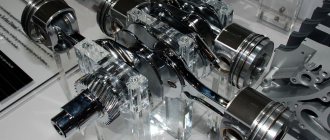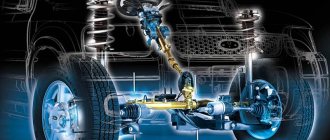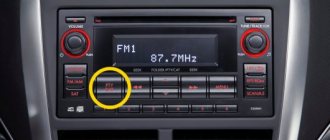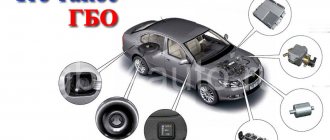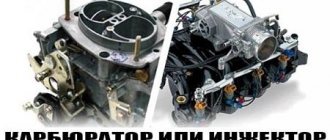During the operation of a car, the biggest expense is fuel. Of course, repairs and maintenance also “eat up” a lot of money, but these are one-time expenses, and gasoline is constantly consumed. Therefore, when the car is actively used, the lion's share of expenses falls on frequent refueling.
In Europe, the problem is being solved by making diesel engines more widespread. But in domestic conditions this option does not work - diesel fuel is even more expensive than gasoline. Therefore, gas becomes the only alternative, and more and more cars, not only cars, but also trucks, are switching to it.
Is gas really better than gasoline, is it worth switching to it, and is it harmful to the engine? These are the most popular questions asked by car owners who want to reduce their costs.
Is gas harmful to the engine?
Although this technique has been used for quite some time, disputes among car owners over which is better - gas or gasoline for the engine - do not subside. Everyone gives their reasons for their point of view, and some are quite valid. But in general, gas has more advantages than disadvantages.
With properly installed and configured equipment, the engine life does not decrease - this is a proven fact. It can withstand 300 thousand kilometers without any problems. Of course, you need to take into account that every 15-20 thousand kilometers it is necessary to carry out maintenance and, if necessary, make adjustments, as well as clean the injectors.
But opponents of such fuel present their arguments about how gas negatively affects a gasoline engine. The fact is that gasoline has a lower combustion temperature, and its increase has a bad effect on various parts - valves burn out faster, piston rings and injectors wear out, etc. In fact, these problems do occur, but only with incorrect adjustment. For example, when switching to gas equipment, the thermal clearance of valves must immediately be increased by 0.05 mm, since they will operate at a higher temperature - by about 40 degrees.
With a properly configured system and correctly made adjustments, nothing burns out or wears out ahead of time. On the contrary, the resource increases precisely due to the fact that initially pure combustible gas is used, and not liquid fuel with a complex composition, many impurities and additives.
The main disadvantage of HBO is the reduction in vehicle traction. Yes, power drops by about 20%. However, this does not in the least interfere with maneuvering in city traffic and does not impair handling. This drawback is noticeably manifested when driving with the accelerator to the floor, but in normal mode it is not relevant.
Pros and cons of gas automotive equipment
An article about the advantages and disadvantages of gas equipment for cars. Parallel use of gas and gasoline, fire hazard, ecology. At the end of the article there is a video about HBO.
Installing gas equipment means quite seriously disrupting the design of the car. Such a decision is not always rewarding, because after such a modification, the warranty on the car will disappear into oblivion, as if it never existed. However, despite this risk, many drivers decide on such a reconstruction, and not without reason.
Positive aspects of HBO for the engine
In general, comparing these types of fuel, there are the following arguments in favor of gas:
- The resource not only does not decrease, but even increases - by about 30%, and this is a lot.
- The gas mixture in the combustion chamber is distributed more evenly and burns more smoothly and completely, which reduces the load on cylinder parts.
- There are no impurities in the gas mixture that could form solid particles after combustion. Therefore, wear on pistons and cylinders is much less.
- No carbon deposits are formed, since the combustion temperature of the gas is higher than that of gasoline and diesel fuel, and the removal of combustion products occurs more efficiently.
- The oil on the cylinder walls is diluted with gasoline and washed off. The gas does not affect it, and the lubrication is not affected.
- Gas fuel is much more environmentally friendly, as it does not contain heavy elements. Only hydrogen is better in this regard.
As you can see, the influence of gas on the engine is minimal. It has a clear advantage over conventional diesel fuel or gasoline. Of course, the drop in power can be decisive, and here traditional options are preferable. But if we consider normal everyday driving in the city or on the highway, then using gas provides considerable cost savings.
In addition, the impact of gas equipment on engine life, when configured correctly, can be regarded as positive. And savings on repairs can also be considerable, although servicing gas equipment, cleaning nozzles and replacing air filters should also be carried out periodically. But these are planned events that cost much less stress than repairing unexpected breakdowns.
Use of other types of fuel
When refueling with two types of automobile fuel, the vehicle's mileage may increase, this is especially important if you need to drive a long distance. When the gas system is operating, the car’s factory fuel pump and its injectors are automatically turned off, and if the engine is of an injection type, the service life can increase several times. Although this does not matter much for a domestic car, for foreign cars it can additionally and significantly save money.
The main disadvantages of a car with installed LPG
There are not many disadvantages, but many of them are quite significant, so they must be taken into account:
- HBO costs not so little - installation will cost at least 20-30 thousand rubles, and if there are many cylinders in the engine, then even more expensive.
- The gas engine loses a little power. Although this is already unimportant for 4th generation HBO, it still happens. Therefore, for a low-power engine this is a bad option. But for a powerful one, the loss of several horsepower will not be noticeable at all.
- You cannot squeeze the gas to the limit, otherwise the engine will overheat and its service life will decrease.
- In a car with low consumption - 6-7 liters of gasoline per 100 km, switching to gas will not provide any economic benefits, it will only create unnecessary problems. But such cars are not suitable for the reason mentioned above - they also have few horses.
- After installing the HBO, you must register it with the traffic police, otherwise you will be fined. This will also cost a pretty penny. In addition, you will need an installer’s license, which means you need to contact certified centers. But this is for the better - you shouldn’t trust such work to random “masters”.
- Gas burns at a higher temperature than gasoline, so the valves wear out faster. This is true, but the problem is largely solved by adjusting them after installing the equipment - increasing the gaps by 0.05 mm. Those who don’t do this then complain about it.
- There are gas stations in many places, but not everywhere. Therefore, you must first decide whether it will be possible to refuel without putting in extra kilometers. Otherwise, all the benefits will come to naught.
- The gas cylinder takes up a lot of space. They usually put it in the trunk, and the free space is greatly reduced.
- Already at -10 degrees, you need to start the engine on gasoline, and only after warming up switch to gas, so you will have to buy a little gasoline, but it will last a long time. The 4th generation LPG relieves the driver of control over fuel types - the electronics itself switches the supply of gas and gasoline according to the situation.
Therefore, if you are deciding whether it is profitable to install gas on your car, then first calculate its consumption for your model, and then the gasoline consumption, plus add the cost of the equipment and its installation with registration. The answer will be this: on a car with a consumption of 10 liters and an annual mileage of at least 10 thousand kilometers, it will be profitable, and the more powerful the car and the more it is used, the more profitable it is. In such cases, the installation pays for itself in a year or even less.
But if you drive a little and the car is a small car, then this may turn out to be unnecessary trouble. Such a car is more likely to fall apart from old age than to recoup the investment, since the benefit per kilometer driven will be scanty.
Equipment manufacturability
I already wrote that the 5th generation of gas equipment has now appeared, and soon the 6th and the sixth will appear. So propane can work with these generations, but methane cannot! And most likely he won’t be able to!
To briefly recall, in the 5th and 6th generations, gas is supplied liquid to the fuel injection system, similar to gasoline. Propane can work with this because it is stored in liquid cylinders, but methane is stored in gaseous form! And such a topic will not work for him, he can use the 4th generation of equipment at most, EVERYTHING IS THE LIMIT! By the way, you can read about the difference between the 4th and 5th generations here .
What do these 5th and 6th generations give, oh guys, a lot of things! Consumption is about the same as on gasoline, there is practically no loss of power! Cold starts can be on gas, and much more! That is, you practically do not see the difference.
Fuel consumption for 5 - 6 generations is the same as for gasoline, that is, 8 - 10 liters (again for a 1.6 liter engine)
I think that's enough evidence. Now let's watch a short video version.
The vote is now on whether you will vote for propane or methane, I'm interested in your thoughts.
This is where I end, I think my article was useful to you, read our AUTOBLOG.
(
27 votes, average: 4.15 out of 5)
Similar news
Cost of gasoline. Let's look at the example of 1 liter in Russia and the United States.
Removes moisture (water) from the gas tank. With your own hands
Which gasoline burns faster, longer and better? 92 – 95 – 98 or 100.
Drying the engine - fiction or truth
There is a widespread belief that gas supposedly “dries out” the engine. As a result, the exhaust valves quickly burn out, and in general the service life of internal combustion engine parts is reduced. Does gas actually harm the engine to that extent?
In fact, this is a misconception. All problems arise due to incorrectly configured equipment. In addition, after installing it, you need to immediately tune the engine, because the mixture will burn at a higher temperature. Thus, burnout of the exhaust valves occurs if old-generation gas equipment was used, and the gas supply was regulated roughly and manually, relying on the electronics, which “will adjust itself.”
Therefore, the answer to the question of whether gas spoils a car engine is simple - no, it doesn’t. All problems arise from incorrectly configured equipment and engine adjustments. If everything is done correctly and operated carefully, then no problems will arise.
Potential harm from propane or methane in a car
First you need to determine exactly what problems may arise from the point of view of operating a car on a gas mixture instead of gasoline. The first feature is a rather dubious connection on various unofficial stations. To connect gas equipment, the technician will delve into the wiring of your car. One wrong move and you'll be looking for the source of your electrical problems for years. You should trust gas installation only to a proven station, where real professionals work.
It is also worth considering the following harmful factors:
- spark plugs will have to be changed more often - they burn out faster with a gas mixture and work ineffectively, which means that you get a low service life of the devices and are forced to spend more money;
- all electronic problems will develop much faster and have a more noticeable effect on the quality of operation of your car, however, this minus can even be considered a definite plus;
- more frequent service and more expensive oils will be required; standard lubricants do not cope with their tasks very well when operating on dry gas;
- there are certain problems with modern units that have turbines or direct injection systems; the cost of gas equipment for such machines will not please you;
- The operating temperature of some engine parts increases, which causes potentially high wear of parts; this does not have a very good effect on the confidence in operating the car.
Why gas valves burn - real reasons
The reasons for valve burnout vary. To understand the effect of HBO on the engine, we list them:
- Pieces of carbon deposits can get into the valve gap and interfere with its movement, causing it to burn faster.
- Incorrectly configured operation of the gas distribution mechanism. This causes the valve to overheat.
- A lean mixture with little fuel and more air. Excessive oxygen in the cylinder oxidizes the metal of the valves.
- Too high a temperature of the exhaust gases, as well as combustion of the mixture in the exhaust tract, leads to overheating of the valves.
- Detonation and other problems with ignition of the mixture in the combustion chamber.
All of these reasons have little to do with gas itself, and such problems can happen with any type of fuel. The first is generally irrelevant, since gas does not form carbon deposits during combustion. Let's look at others in more detail.
Incorrect timing settings can lead to problems with any fuel. This is the responsibility of the master who carried out the adjustment. He must also adjust the temperature gap of the valves, since at higher temperatures the metal expands more, and the gap must be increased by 0.05 mm.
Gas also has nothing to do with a lean mixture. This requires checking the fuel system as a whole. Some car enthusiasts deliberately use a lean mixture to save fuel - in this case, they only have themselves to blame for the problems.
Burnout in the gas exhaust duct is possible. But, again, this is typical for methane, and a propane-butane mixture does not cause such a problem if the LPG is configured correctly.
Gas has an octane number of more than 100, versus 95 for gasoline. It ignites at a higher temperature, so there may be problems with the ignition, which needs to be adjusted. But detonation does not happen in a gasoline engine adapted for gas. But valves can suffer due to detonation, so this type of fuel has no disadvantages in this regard at all.
Thus, gas equipment in itself does not negatively affect the engine. All problems stem from incorrect configuration of all systems during unqualified installation.
Are there any obvious disadvantages?
The disadvantages of installing LPG on a passenger car can be listed point by point:
- high installation cost;
- increase in the total weight of the vehicle;
- loss of useful trunk space;
- decreased dynamics of acceleration and speed, the need for additional ignition adjustment;
- insufficient number of gas stations;
- incomplete refueling due to the characteristics of the equipment.
Each driver independently determines for himself the appropriateness of HBO. It is important to entrust this work exclusively to professionals, and to carry out regular maintenance during operation.
Author: Baranov Vitaly Petrovich
Education: secondary specialized. Specialty: car mechanic. Professional diagnostics, repair, maintenance of passenger cars of foreign production 2000-2015. Extensive experience working with Japanese and German cars.
How to avoid the harmful effects of HBO on internal combustion engines
The question of what is better for the engine - gas or gasoline - is irrelevant. It can operate almost identically on any of these fuels. This is rather an economic issue. We looked at how gas affects engine operation, and we didn’t find anything bad either. However, this is only possible under the following conditions:
- Installation of gas equipment is carried out by qualified specialists who will correctly configure all systems.
- The car owner carries out timely maintenance and promptly replaces consumables, such as the air filter.
- In addition, LPG is by no means safe, just like gasoline, so periodic checking of the tightness of all connections and containers is required.
If all conditions are met, using a gas engine is generally more profitable than using gasoline. In addition to saving on fuel, the life of the internal combustion engine is also significantly extended, that is, you will have to buy expensive parts, or even change the car much less often.
The main advantages of gas cylinder equipment
The main advantage of gas fuel is its efficiency. Despite the fact that a car consumes 20% more gas, it is almost two times cheaper than gasoline.
But you need to keep in mind that such savings will only work for you if you use the car with maximum intensity. Otherwise, the benefits of installing such equipment will become very doubtful.
The reason for making such a decision may be the following circumstances: with an engine with a small volume, as well as with low mileage, your costs for purchasing gas equipment will take too long to pay off, especially if you take into account the difference in the prices of one liter of gasoline and one liter of gas.
